Nonviolence
You can’t blame me for flinching
back against the wall
when a small boy points his
pistol at me and yells “Pow! Pow! Pow!”
I am lying back there somewhere
feeling the sidewalk as if I’d never touched
sunshine, pumping out my urgent
puddle
AS AN OUTSIDER, Virginia Woolf eschewed labels that attempted to relegate her to tidy boxes. The label “feminist” should die, the British novelist wrote in Three Guineas, an essay published in 1938 that married equal opportunities and pay for women with how a society might prevent fascism and war.
Likewise, despite her disdain for war, she would not claim herself a “pacifist.” The only label she allowed for herself was “outsider,” and perhaps because of that, many of her novels are concerned with outsiders. But it wasn’t just outsider status that fascinated her: It was the way patriarchal structures punished outsiders for failing to conform to and live within their confines, most notably those associated with war.
Woolf’s intellectual and social concerns form the subtext of many of her novels. While Woolf’s 1925 novel Mrs. Dalloway has not traditionally been labeled an anti-war novel, it reveals a rich theology of hospitality, an antidote to war and the moral injury that results from the ways that war wastes human life. Outsiders hold the key to this theology in the way they form their peculiar values despite the patriarchal structure’s insistence that they are frivolous, cowardly, or only after personal gain.
When we in this country behave this poorly, a nation that stands on simple truths about equality, respect, life, and freedom, perhaps the time has come to be silent.
WHEN DANIEL and Philip Berrigan, A.J. Muste, John Howard Yoder, and a handful of Catholic radicals gathered in 1964 with Thomas Merton at the Abbey of Gethsemani in Kentucky for a retreat concerning the spiritual roots of protest, the intercessions of that meeting, I am convinced, not only seeded a movement but summoned my vocation.
Four years later when Daniel and Phil Berrigan and seven others entered the draft board in Catonsville, Md., removed 1A files and burned them with homemade napalm, those ashes too would eventually anoint my pastoral calling. October marks the 50th anniversary of the trial of the Catonsville Nine. Released in February 1973 after 18 months in the federal penitentiary at Danbury, Conn., Daniel Berrigan came to New York and taught the Apocalypse of John when I was a student at Union Seminary. Full disclosure: He became to me not merely teacher, but mentor and friend.
In the year following Dan’s death (April 30, 2016), Jim Forest undertook the heroic literary effort of writing At Play in the Lions’ Den. Perhaps he had a running start. Three things of note up front. One is that Forest’s own life is inextricably tangled with Berrigan’s. He was, for example, editor of The Catholic Worker when Dan first appeared there, was part of the 1964 retreat with Merton, and responded to Catonsville by joining others in a draft board raid in Milwaukee within the year. So, like the Acts of the Apostles, there are whole sections of this book written in the first-person voice. Or betimes, Forest just peeks from behind the elegantly researched narrative to lend a knowing detail. This is a risky wire act. Don’t fall into self-aggrandizement (his genuine modesty saves him that) or the net of hagiography. And best to name this from the start, in the subtitle: “biography” and “memoir,” a difficult art Forest has mastered.
A group of about 20 peacemakers are embarking on an 11-day, 110-mile walk from Savannah, Ga., to Kings Bay, Ga. Named, “Disarm Trident: Savannah to Kings Bay Peace Walk,” the action is a call to abolish nuclear weapons globally and is supporting the seven Catholic activists arrested back in April on the Kings Bay Naval Submarine Base back in April.
“We will walk in nonviolence and prayer with the hope of bending the moral arc of the world towards justice and peace,” Kathy Kelly, one of the organizers of the walk, said in a news release.
Times reporter Edward B. Fiske observed how conservative evangelical Protestants supported the war. Many, like the theologian and editor of Christianity Today, Carl F. Henry, believed it to be morally defensible. Fiske wrote that “the majority of laymen and clergy in this country” were more in agreement with Carl Henry than with William Sloane Coffin.
LONG BEFORE Boko Haram emerged in 2002, my home country of Nigeria was polarized along religious and ethnic lines by politicians who sought to pit one group against another. Disputes about religious freedom, resource control, and citizenship led to violent conflicts at the local and state levels. Many religious sites were desecrated.
Nigeria, the most populous country in Africa and seventh most populous worldwide, is fondly referred to as “the giant of West Africa.” It has the largest economy on the continent and is incredibly diverse in ethnicity and religion. Half of Nigeria’s population is Christian, living mostly in the southern part of the country, and the other half is Muslim, living primarily in the north.
In 2009, while I was pastor of a Catholic parish in Kano State, in northern Nigeria, a bloody confrontation broke out between the Nigeria Police Force and Boko Haram about 300 miles away in the northeast part of the country. Two years later, I was caring for eight families who had fled to the city of Kaduna, seeking safety from Boko Haram attacks. As I listened to their stories, I could not help but think of my own family’s displacement after riots in 1980 and 2002. Our congregation and my own family had been directly impacted by violent ethno-religious conflicts.
But the norm in the part of northern Nigeria where I grew up was very different from that. Christians and Muslims lived together as neighbors and friends. Young people bonded as they played sports with one another. Muslims and Christians exchanged greetings and attended one another’s naming and marriage ceremonies. We rejoiced and grieved together.
This included Nasiru, Ahmad, and Abdul, three of my Muslim neighbors who joined Boko Haram in 2009. They were attracted to Boko Haram because of their frustration with overwhelming socioeconomic inequality that had left them impoverished and unemployed. From their perspective, the ostentatious lifestyle of the political class indicated corruption, poor governance, and improperly managed resources. Boko Haram seemed to promise justice.
“We feel hopeful when the preacher reminds us that those who rob us of our livelihood will be judged and damned,” I remember Nasiru saying to me.
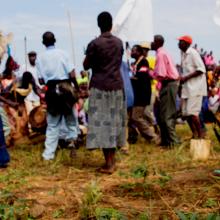
Cedric Crucke / Shutterstock.com
REMEMBER WHEN the Kony 2012 video went viral? The short documentary, produced by the controversial Invisible Children organization about brutal Ugandan rebel Joseph Kony and the Lord’s Resistance Army, purportedly reached more than half of young adults in the U.S. when it was released. Young Christians across the country swarmed their elected representatives, urging action against Kony, which quickly legitimized Obama’s deployment of U.S. military forces to hunt a relatively idle madman with depleted resources.
Since then, U.S. militarization in Africa has shown no sign of slowing. In 2006, according to The Intercept, “just 1 percent of [U.S.] commandos sent overseas were deployed in the U.S. Africa Command [AFRICOM] area of operations. In 2016, 17.26 percent of all U.S. Special Operations forces ... deployed abroad were sent to Africa.” The U.S. admits to the existence of one permanent base in Africa, in Djibouti on the Gulf of Aden, while U.S. special forces are deployed in “more than 60 percent of the 54 countries on the continent.”
Special operations and collaborations with proxy militias enable U.S. militarism in Africa to persist with very little public awareness or oversight—and wreak havoc on local populations.
“By keeping us in a state of perpetual war, the arms trade grows,” said Norman Tumuhimbise, a Ugandan youth activist kidnapped and tortured in 2015 by a branch of Uganda’s military that trains under U.S. anti-terror programs.
I FIRST HEARD Archbishop Desmond Tutu speak at the National Cathedral in Washington, D.C., sometime around 1987. It was at the height of apartheid in South Africa, and the world was just waking up to its horrors and organizing global economic sanctions.
Tutu spoke of an elderly woman he had met a few days earlier in Soweto. She told him that every night she got up at 2 a.m. for an hour in order to beg God solemnly for an end to apartheid. “I know we will win now,” Tutu told us, “because God cannot resist the prayer of that poor old woman.” With that, he burst into tears. Those tears of peace converted the thousands of us who crowded in to hear him. We had never heard such a witness for peace.
Later, I came to know him as a friend. During my 2014 pilgrimage to South Africa, I spent a morning visiting the great man at his foundation headquarters in Cape Town. First, we had Mass together with his staff; then he catered a brunch for me and my friends. He and I helped ourselves to a plate of food and coffee, then sat together by ourselves for an hour.
“We do not have the right to give up this work,” he told me. “Our sisters and brothers are suffering around the world, so we have to keep working for peace and justice till the day we die.” I was amazed to hear that he planned to leave the next day for Iran. He was in his 80s, in bad health, and relentless.
He spoke of the millions of squatters living in total poverty around Cape Town and elsewhere. “We have the ultimate First World wealth and the worst Third World poverty, the biggest gap between rich and poor in the world,” he said. “One percent of the money for war and nuclear weapons could feed and house these poor people. Sometimes I say to God, ‘What the heck is going on? Why don’t you do something?’”
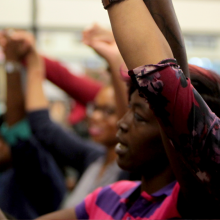
a katz / Shutterstock, Inc.
IN DECEMBER 2014, the United Nations approved a resolution put forth by Bangladesh and more than 100 other countries that included a reference to “unarmed civilian protection.” This was the first time the phrase had been referenced in an official U.N. General Assembly document.
The following year, a U.N. report noted that “unarmed civilian protection is a method for direct protection of civilians and violence reduction that has grown in practice and recognition. In the last few years, it has especially proven its effectiveness to protect women and girls.”
Last fall, Tiffany Easthom, executive director of Nonviolent Peaceforce, addressed a special U.N. session on unarmed civilian protection with a bold proposal: “The [U.N.] Security Council could ensure the centrality of unarmed strategies in protection of civilian mandates.”
Unarmed civilian protection, or UCP, is just what it sounds like: nonviolent action by civilians to protect other civilians from political violence. The peacekeeping practice is rooted in the call for a “peace army”—a Shanti Sena—by Mohandas Gandhi and Khan Abdul Ghaffar Khan, whom the pope referenced in his 2017 World Day of Peace message.
Peace Brigades International is generally credited with initiating the current practice in the 1980s in Guatemala. Peace Brigades International focused on specific strategies based on the principles and practices of nonviolence, the primacy of local actors, independence, and for many but not all organizations, nonpartisanship, in an organized, disciplined way.
Many organizations around the world are currently practicing this method of intervention, including Peace Brigades International, Nonviolent Peaceforce, Christian Peacemaker Teams, SweFOR, Meta Peace Team, Operation Dove, Ecumenical Accompaniment Programme in Palestine and Israel, the Presbyterian Peace Fellowship, and others.
“Since being in India, I am more convinced than ever before that the method of nonviolent resistance is the most potent weapon available to oppressed people in their struggle for justice and human dignity,” King said in a radio address in India.
Each holy sacrament — baptism, eucharist, confirmation, reconciliation, marriage, holy orders, anointing of the sick — is a way for Catholics to show that we are with God, and God is with us. And we are with each other.
At one time or another, we decided that the church is a body created to spiritually house and care for the world. But today in America, the word Christian has a lot of connotations to the average person. It’s confusing, and it brings up a lot of conversations about dividing lines and political parties and inclusion versus exclusion.
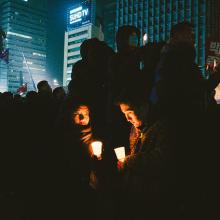
Image via Ken Shin/Flickr
We cannot leave the fate of our world and our future generations exclusively to the political leaders of our time. As Christian citizens of every nation, we have a responsibility to bear witness to the things that make for peace.
With these words the pope is also reshaping what it means to be “pro-life.” He is moving it away from primarily opposing abortion and stressing that it means protecting life at every stage, from womb to natural death.
As Father Richard McSorley of Georgetown University wrote years ago, “It’s a sin to build a nuclear weapon.” We once put that on a poster. Perhaps it’s time to put the poster back up.
1. How to Talk to Climate Change Skeptics in Your Church
This weekend, the People’s Climate March hits Washington, D.C., and sister marches are planned throughout the country. But 7 in 10 people don’t talk about climate change with friends and family. Here’s how to start.
2. Women Are Dying Because Doctors Treat Us Like Men
Marie Claire’s Kayla Webley Adler digs into the systemic reasons behind why female patients' symptoms are less likely to be taken seriously by doctors, and women are more likely to be misdiagnosed, have their symptoms go unrecognized, or be told what they're experiencing is psychosomatic.
With the blessing of Pope Francis, Cardinal Blase Cupich on April 4 unveiled an anti-violence initiative for this beleaguered city that will be underscored by a Good Friday procession, using the traditional stations of Jesus’ way to the cross to commemorate those who have lost their lives in street violence.
Cupich said he was inviting civic, education, and religious leaders, and “all people of good will,” to take part in the April 14 “Peace Walk” through the heart of the violence-scarred Englewood neighborhood.
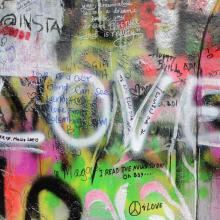
The Lennon Wall in Prague. emka74 / Shutterstock.com
St. Valentine came from a long Jewish and Christian tradition of national resistance based on love. Following Jesus, it resists unjust and unloving national policies. But it’s also a love that refuses to demonize those who enact those policies. Rather, like Jesus teaches, it’s a love that embraces all people, including those we call our enemies.
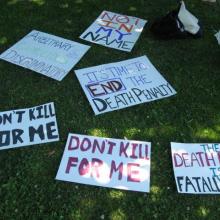
Image by javacolleen / flickr.com
We march on Jan. 17 because it is the 40th anniversary of the first "modern-era" execution, after our courts ruled in favor of the death penalty following a decade-long moratorium. On that day, Gary Gilmore was executed by firing squad in Utah in revenge for his murders of Max Jenson and Ben Bushnell. Since then there have been 1,442 other executions. We will hold 40 signs, one for each year since 1977, with the names of those executed each year. We will also carry roses for the victims — both those who have been murdered and those who have been executed — declaring that violence is the disease … not the cure.













